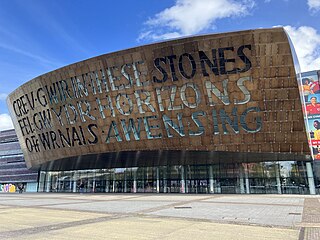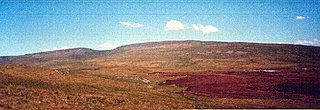Welsh National Opera (WNO) is an opera company based in Cardiff, Wales. WNO gave its first performances in 1946. The company began as a mainly amateur body and transformed into an all-professional ensemble by 1973. In its early days, the company gave a single week's annual season in Cardiff, gradually extending its schedule to become an all-year-round operation, with its own salaried chorus and orchestra. It has been described by The New York Times as "one of the finest operatic ensembles in Europe".

Wales Millennium Centre (WMC) is Wales' national arts centre located in the Cardiff Bay area of Cardiff, Wales. The site covers a total area of 7.5 acres (3.0 ha). Phase 1 of the building was opened during the weekend of 26–28 November 2004 and phase 2 opened on 22 January 2009 with an inaugural concert.

The Arts Council of Wales is a Welsh Government-sponsored body, responsible for funding and developing the arts in Wales.

This article is about the particular significance of the year 1992 to Wales and its people.
This article is about the particular significance of the year 1988 to Wales and its people.

This article is about the particular significance of the year 1980 to Wales and the Welsh people.
Aneirin Talfan Davies OBE, was a Welsh poet, broadcaster and literary critic.
John Osmond is a Welsh writer, journalist, former political candidate for Plaid Cymru, and think tank director. He has contributed to numerous books on the subjects of Welsh politics, culture and devolution, and is also a former television producer. Osmond was the founder director of the independent Welsh think-tank, the Institute of Welsh Affairs in 1996 until May 2013. In 2018 he published the first of a trilogy of documentary novels, Ten Million Stars are Burning, which together record the history of Wales between the 1979 and 1997 devolution referendums. Between 2018 and 2022 he was Special Adviser to Plaid Cymru leader Adam Price. In that capacity, in the wake of the 20212 Senedd election he was involved in negotiating the Co-operation Agreement between Labour and Plaid. In 2024 he published an account of how this emerged and its impact, The Politics of Co-Opposition: The Inside Story of the 2021-24 Co-Operation Agreement between Plaid Cymru and Welsh Labour.
Sir Alun Talfan Davies was a Welsh judge, publisher and Liberal politician.
Geraint Davies may refer to:
This article is about the particular significance of the year 2008 to Wales and its people.

Television in Wales began in 1952. Initially, all programmes were in English with occasional Welsh language programmes. In 1982 Welsh language channel S4C was launched. The digital switchover happened in 2009-2010 and S4C became an exclusively Welsh language channel.
The Lloyd George Society is an organisation connected with, but not formally affiliated to, the Liberal Democrats. It is named after David Lloyd George, the Welsh Liberal politician who was British prime minister from 1916–1922.
The 1943 University of Wales by-election was a parliamentary by-election held in the United Kingdom between 25 and 29 January 1943 for the House of Commons constituency of University of Wales.

The Bank of Wales was a commercial bank in Wales which was founded in 1971. The bank was taken over by the Bank of Scotland plc in 1986 and ceased trading under the Welsh brand in 2002. It is now a trading name used by Bank of Scotland plc, a subsidiary of Lloyds Banking Group.
Geraint Stanley Jones was a Welsh television executive. From 1981 to 1989, Jones was the Controller of BBC Wales, from which he oversaw the launch of S4C, the Welsh-language public-service television channel, in 1982. Jones also served as the chief executive of S4C from 1989 to 1994.
Rhodri Talfan Davies is a Welsh media executive. He is Director of Nations at the BBC and was the director of BBC Cymru Wales from 2011-2020. He is a former journalist and communications executive.

Alun Bennett Oldfield-Davies was a Welsh broadcaster and public servant. He joined the BBC in 1937, holding several posts before being appointed director of the Welsh Region for BBC radio. Throughout his long stewardship of the BBC in Wales, he oversaw a golden age in Welsh spoken broadcasting, and always sought to increase the resources for Welsh broadcasting. He oversaw the introduction of television broadcasting in Wales, and although seen as unadventurous by some, his devotion to the Welsh language was absolute.
Dragon's Eye was a long-established BBC Cymru Wales weekly television programme, covering news and analysis of politics in Wales. It was broadcast between 2000 and 2012.

The Institute of Welsh Affairs (IWA) is an independent charity and membership-based think-tank based Cardiff, Wales, which specialises in public policy and debate around the economy, education, environment and health sectors in Wales.







